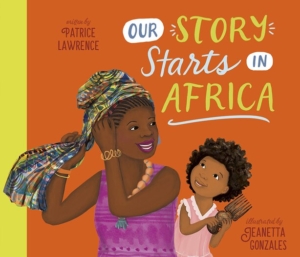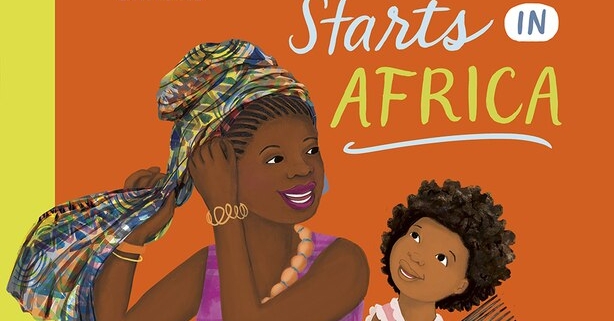The Mission to write Our Story starts in Africa by Patrice Lawrence
Patrice Lawrence writes about her challenge in writing her book, Our Story starts in Africa, and the reasons why it is so important.

OUR STORY STARTS IN AFRICA by Patrice Lawrence illustrated by Jeanetta Gonzales ISBN 9781913520588. published by Magic Cat
The Mission to Write Our Story Starts In Africa
“Your mission, if you choose to accept, is to write a history of the continent of Africa, in less than 800 words. For four-year-olds.”
That’s definitely a mission. And I accepted. Why?
My perceptions of Africa are shaped by my English education, and the media and popular culture influences that surrounded me as I was growing up. Africa was a place that was explored and discovered by white European heroes as if no one had lived there before. It was the nasty caricatures in Hugh Lofting’s Doctor Doolittle books or Hergé’s Tin Tin in the Congo. It was a continent riddled by corruption or famine that needed European intervention to save – (and a note to whoever wrote the lyrics to Band Aid’s ‘Feed The World,’ it actually snows on Mount Kenya quite often.) Africa was the source of leaders’ names that could be mocked by British comedians and, in the school curriculum, its history focussed on enslavement – and the British abolitionists that ended it.
Of course there were some positive depictions. Apartheid was appalling, but it catalysed political awareness and anti-racist activism in many young people. And yes, there is music and sport. (Even for cynical me, Makazole Mapimpithe lifting the trophy when the multi-ethnic South African rugby teamwon the world cup in 2019, brought a tear to my eye.)
But that isn’t enough to challenge those enduring stereotypes of a ‘dark continent’, rife with ‘third world’ poverty and lacking in the rich history of artistic and scientific achievement that is so lauded in Europe.
So how do we change these perceptions?
For many years, I worked in the early years sector promoting equality. Research shows that children absorb the mainstream world’s biases and prejudices at a very young age. This not only damages the children that are stereotyped but the ones who, from an early age, learn that other lives are less valuable than their own.
I strongly believe that we can change that with children’s books. (After four years of judging the Little Rebels Award for children’s books that promote social justice, I’m even more utterly convinced of that.) Books can prompt conversations, widen curiosity and help children who feel unseen feel pride in who they are.
In Our Story Starts in Africa, I wanted to use a particular framing device. I visited my family in Trinidad for the first time when I was six. I lived in 1970s Sussex where few people looked like me. Suddenly, I was in this jewel-bright world of Trinidad, meeting my grandma and many cousins – and no one could understand my English accent at all. The place where I thought I might belong, I didn’t.
In the book, young Paloma is confronted with the same challenge. Tante Janet, her great-aunt, sets out to make Paloma feel both wanted and proud. She tells Paloma that the first people considered to be modern humans lived in Africa – that all of our stories start in Africa! As Paloma listens enthralled, Tante Janet describes the wealthy ancient civilizations, the renown Library of Alexandria and the exploits of the warrior queen, Amanarenis, who led the Kushite army against the Romans in 25BCE.
Have you heard of Queen Amanarenis? Or any of the other African warrior queens? I hadn’t until I researched the book. I knew nothing of the Scramble for Africa until adulthood. (That was when the leaders of European countries carved up the continent and shared their newly reassembled and renamed countries – and those countries’ valuable resources – out amongst themselves.) It had never even occurred to me to question why European languages were the official languages in so many African countries. For me, European languages, especially English, were the default.
And yes, the book does touch on colonialism and enslavement. It is part of Africa’s history and mine, as a British-born Caribbean Black woman. My ultimate hope, though, is that Our Story Starts in Africa will make children of African heritage feel pride in their heritage and those who aren’t clamour to know more!
Patrice Lawrence grew up in a Trinidadian and Italian household in Sussex, the first in her family to be born in the UK. Her books for young adults have won many prizes including the YA Prize, the Waterstones Prize for Older Children’s Fiction, the Crimefest YA Prize twice and the inaugural Jhalak Prize for Children and Young People. She is passionate about children seeing themselves in books. She was awarded an MBE for literature in June 2021.
Views expressed do not necessarily reflect those of the Federation.




